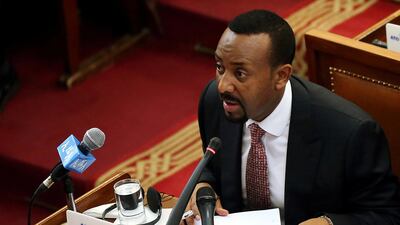A humanitarian crisis is bubbling in southern Ethiopia, where 1.2 million people have been displaced since April by ethnic violence, according to a new United Nations report.
In the past month alone, 800,000 have been forced to flee their homes. The Ethiopian government estimated late last month that US$117.7m (Dh432m) was urgently required to alleviate the crisis.
The crisis underlines a key challenge for new Prime Minister Abiy Ahmed, who took power in April after mass protests sparked his predecessor’s shock resignation.
Mr Abiy has embarked on a sweeping reform programme designed to transform Africa’s second most-populous country and ease ethnic tensions. In doing so, he has drawn high praise from international observers and spurred great enthusiasm within the country.
But for all his success, endemic ethnic tensions, decades in the making, present a persistent challenge.
With more than 100 million people, Ethiopia is extraordinarily diverse. After taking power in 1991 following a bloody civil war, the ruling EPRDF coalition established regional states based on ethnicity.
But residual tensions between different ethnic groups sporadically spiral into communal violence – generally driven by resource scarcity and land disputes.
The fighting is localised in the border areas of Gedeo – in the Southern Nations, Nationalities and Peoples Region – and West Guji in Oromia state.
"The violence is small-scale but significant when you take into account other border conflicts in Ethiopia," Ahmed Soliman, research fellow in the Africa Programme at Chatham House, told The National.
______________
Read more:
Ethiopia's new Prime Minister isn't afraid to shake things up
Deadly explosion at Ethiopian PM's rally
UAE pledges Dh11 billion in economic aid to Ethiopia
______________
The violence, which has killed as many as 200 since last month, has in turn sparked a humanitarian crisis in one of the country’s most densely populated regions.
Water, food and health services are stretched beyond capacity, while overcrowding at camps for the diplaced have raised fears of gender-based violence.
“The EPRDF government responded swiftly to prevent escalation, with Mr Abiy visiting the region and urging reconciliation efforts,” said Mr Soliman.
But the episode signifies the challenges faced by Ethiopia’s energetic young leader, its first from the large but economically and politically marginalised Oromo ethnic group.
The pace of his reforms has taken many by surprise since he succeeded Hailemariam Desalegn in April.
Last month, he announced his government was willing to abide by a 2002 peace deal with Eritrea, ceding a stretch of land in the process, potentially ending one of Africa’s longest and bloodiest wars.
“It is unlikely Mr Hailemariam was ever sufficiently secure in his position to surrender territory to Ethiopia’s arch-rival,” said Ed Hobey-Hamsher, senior Africa analyst at the global risk consultancy Verisk Maplecroft. “Mr Abiy has sufficiently consolidated power to do so. This bodes well for his political and economic reform programme.”
The prime minister has released thousands of jailed politicians, activists and protesters and on Wednesday fired scores of senior prison officials over harrowing allegations of torture in Ethiopian jails.
Mr Abiy has also taken steps to liberalise the country’s traditionally tightly-controlled economy – by allowing foreign investors to acquire stakes in state firms, including Ethiopian Airlines, Africa’s most successful airline.
The liberalisation was epitomised by the opening of the country’s first Pizza Hut in its capital, Addis Ababa, in April.
Impressive development is expected from what was once Africa’s fastest-growing economy.
“The size of the Ethiopian market, the country’s competitive labour and energy costs, the reform potential of Mr Abiy and the fear of missing out will encourage investors,” said Mr Hobey-Hamsher.
But all the while, the violence in the south serves as a reminder of a problem even Mr Abiy will struggle to overcome.

